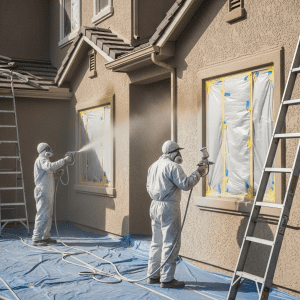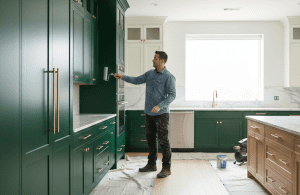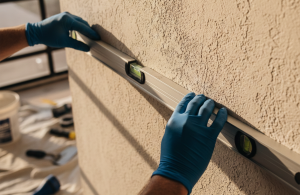There’s a moment after painting when the world feels lighter.
The light hits the walls differently, the air around the house cools just a touch, and everything seems fresh again.
In Arizona, that moment takes work. Color behaves differently here. The desert light has moods of its own – soft at sunrise, brutal by noon, gold and forgiving before dusk. Picking a shade that survives all three is half science, half patience.
That’s why exterior house painting around Phoenix isn’t just about looks. It’s about endurance. The paint fights through months of bone-dry heat, swirling dust, and sun that never quits. The right color isn’t just pretty; it stays true through another summer that hits triple digits.
Start With What the House Gives You
Every house already has a rhythm.
Some stand tall and modern, all edges and clean lines. Others curve and breathe like old Spanish villas – tile roofs, thick stucco, a bit of shadow under every window arch.
A shade that feels calm on one place can look out of place on another. That’s why residential exterior painting should start with what’s already there: the roof color, the surface texture, even the pattern of afternoon shade.
Homes with red clay tiles and heavy walls love warm, earthy colors – sand, gold, faded terracotta. Sleeker builds come alive with cooler neutrals: chalk white, ash gray, soft greige. The point isn’t to shout. It’s to blend with the desert without disappearing into it.
Desert Light Changes Everything
Pick paint inside a store and it’ll lie to you.
Take it outside and the truth shows up fast.
The morning sun warms every color. By noon, the same paint can look pale and washed. At sunset, it glows again. That’s why professional exterior painters always test patches on real walls before buying gallons of it.
In this climate, lighter shades usually last longer. They reflect heat, fade slower, and help keep interiors cooler. Cream, ivory, dusty beige – they hold their tone through glare and storm alike.
Look Beyond the Walls
Color never works alone. Roof, stone trim, gravel, plants – everything around the house affects what the eye sees.
A soft white wall feels balanced next to a red roof but can turn cold beside gray metal. Desert sage or agave near the house can make warm tones sing, while dark gravel pulls light from pale paint.
Before diving into an exterior house painting project, step back across the street and take it all in. The goal is flow, not contrast for contrast’s sake.
Durability Is Design
Here the sun doesn’t just shine; it scours. Paint that isn’t built for it starts to chalk and fade before the year’s out.
That’s why homeowners lean on exterior painters in Arizona who know the chemistry behind local paints. The good ones pick coatings made for high UV and dry heat. They cost a little more, but they stay solid through dust storms and August afternoons.
Good paint is quiet protection. You don’t notice it working, but you notice fast when it fails.
The Right Finish Makes All the Difference
Not every surface wants the same finish.
Matte is soft, almost velvety, but dust loves it. Glossy finishes are tough yet blinding in midday sun.
Most desert homes settle for satin or eggshell. They’ve got that faint glow when the sun hits, they rinse clean with a hose, and they hide small cracks better than most. Pick that balance once and you won’t need to repaint anytime soon.
Color Shapes Mood and Memory
Some houses make you slow down when you pass by. You can’t name why – it just feels right.
That’s color psychology at work.
Warm neutrals – beige, tan, sand – feel open and welcoming. Cooler tones like sage or gray calm everything down. Planning to sell? Stick to neutrals; buyers see possibility in them. Painting for yourself? Trust what feels like home when you see it in the evening light.
Just remember, bold hues fade faster here. Talk to professional exterior painters before you commit; they’ve seen which colors stand up and which surrender.
Preparation Is Half the Battle
Painting looks simple until you try it. The truth is, lasting results come from what happens before the color. Cleaning, patching, sealing, priming – those steps decide whether the paint stays or peels.
Seasoned exterior painters in Arizona know how to read a wall. They spot weak stucco, choose the right primer for dry air, and apply coats that cure instead of crack. You see the payoff years later when the color still looks new under that relentless sun.
Final Thoughts
The best color isn’t the trendy one. It’s the one that fits – the walls, the light, the sky that keeps changing above it.
When exterior house painting is done right, the home feels alive again. Air moves easier. Shadows look softer. Even the heat seems less harsh.
Take your time. Tape those sample cards on the wall, watch how they shift through the day, and let the sun decide what stays.
When you’re ready, call professional exterior painters who know the difference between paint that lasts and paint that quits. They’ll help you find a color built for monsoon dust, blazing afternoons, and that quiet, golden hour when everything glows.
Because paint isn’t just color. It’s comfort when you pull up at dusk, pride when the walls still look sharp after years in the desert, and the thin, strong layer that helps your home stand tall.





